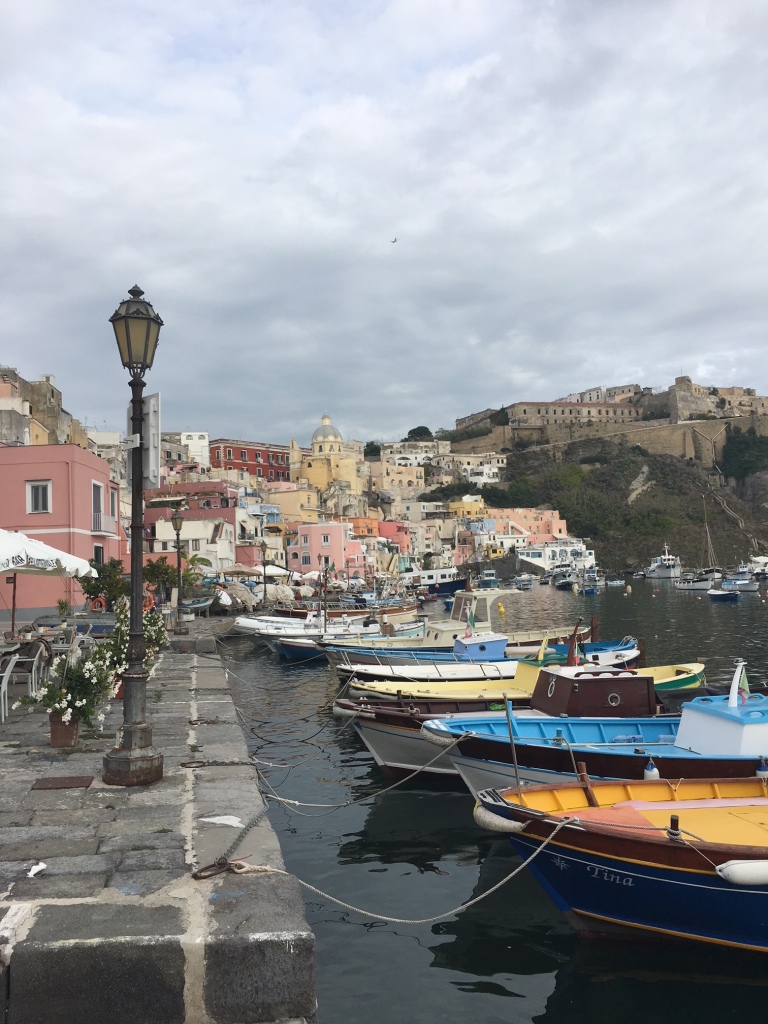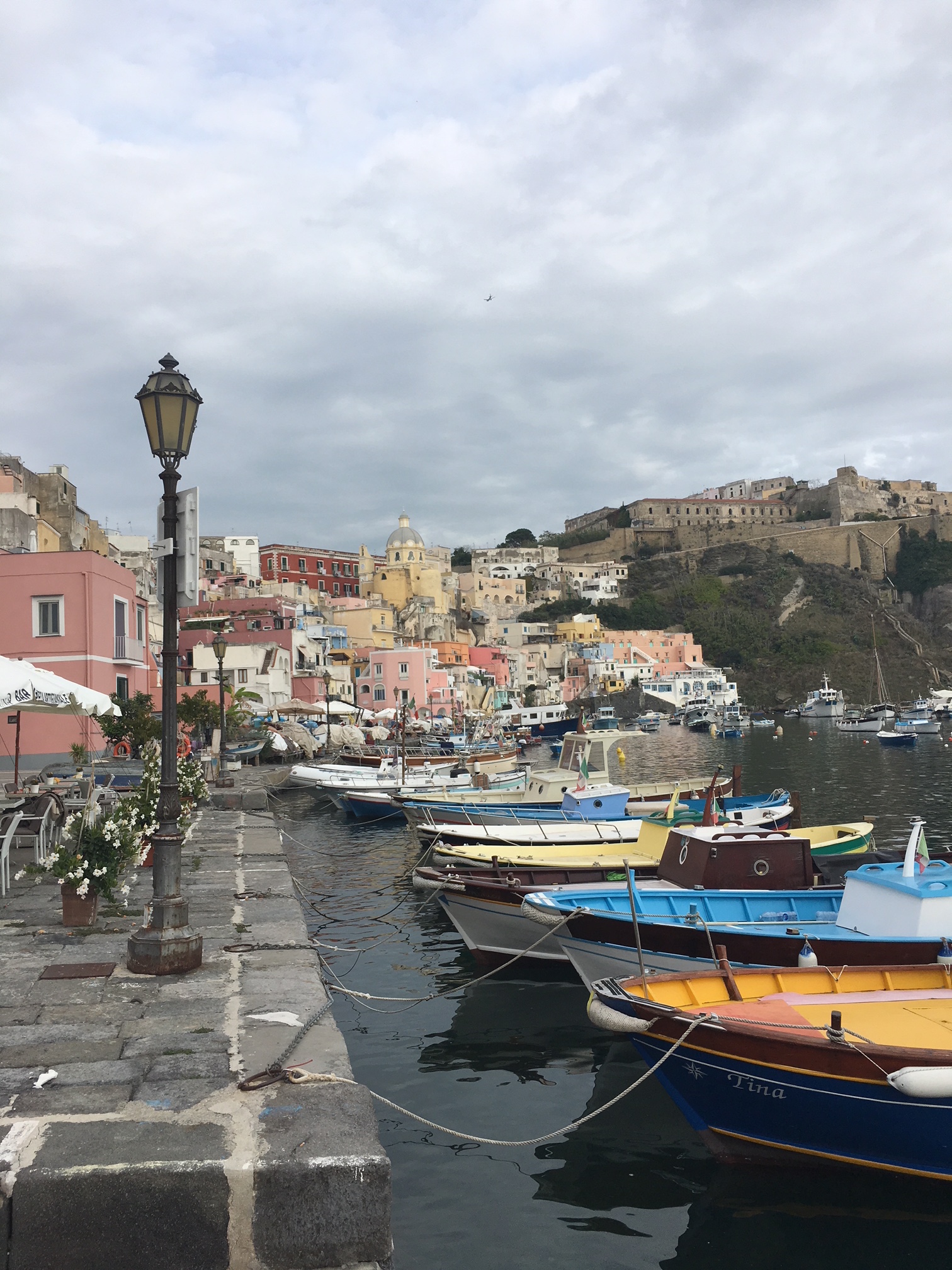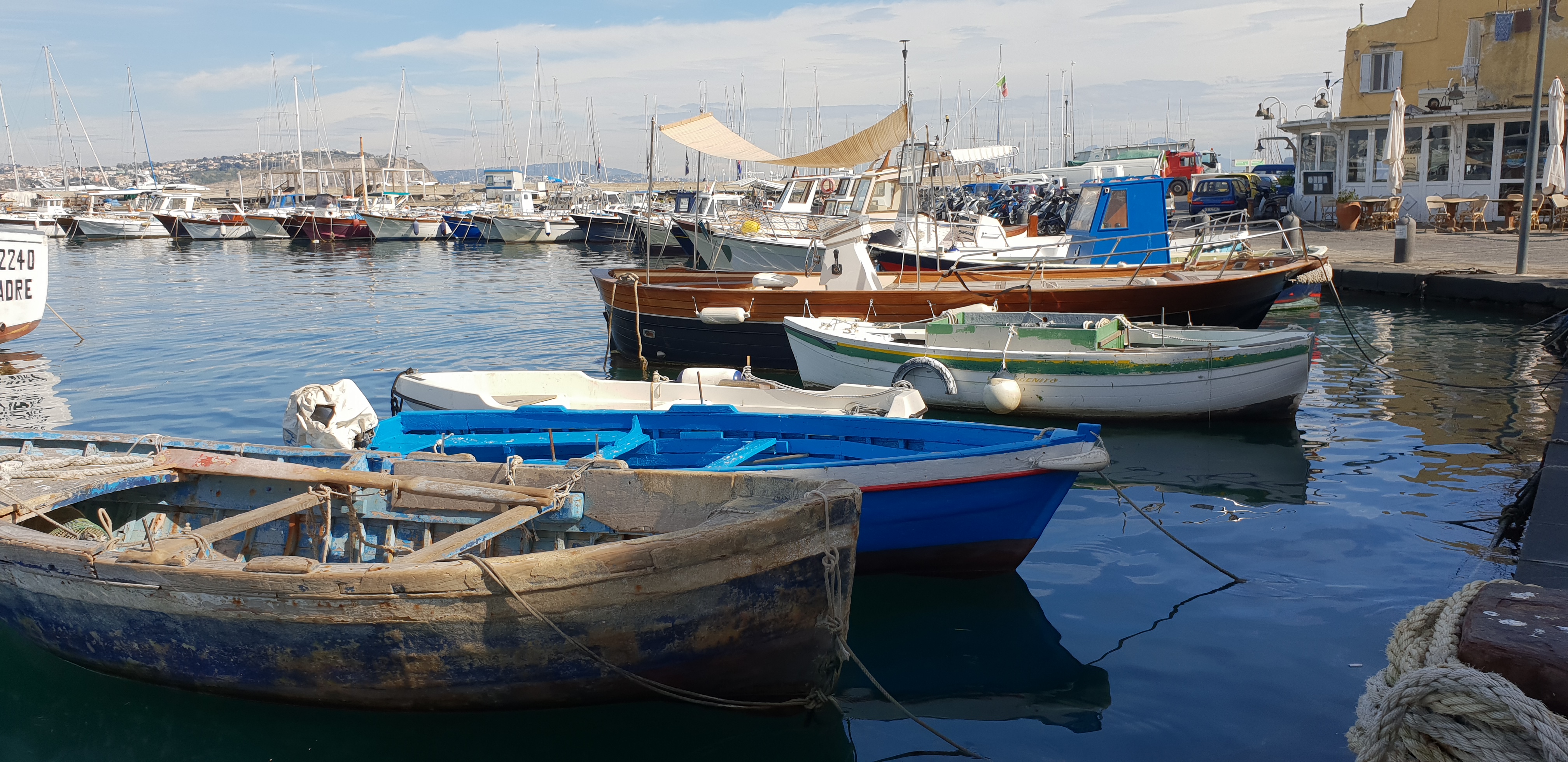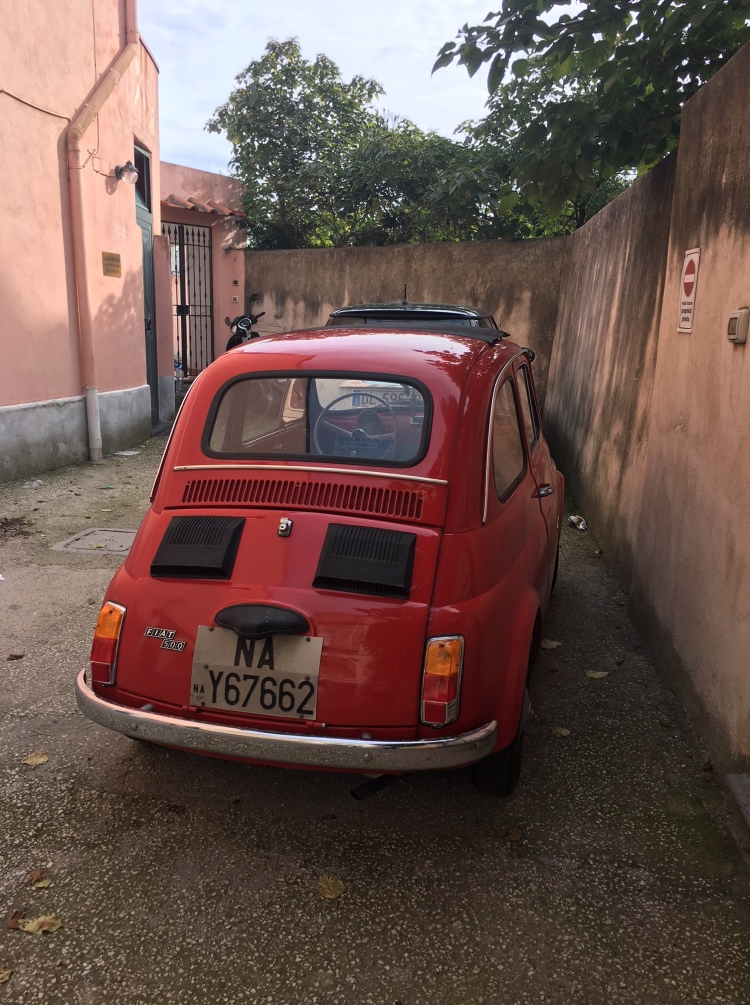PROCIDA is a charming and sleepy, small island, just off the coast of Naples. The island is the lesser known sister to the islands of Capri and Ischia. Beloved by film makers for many years, the island has two very typical, traditional small harbours, and a patchwork of delightful tiny roads, traversing the hillsides and criss-crossing this rocky outcrop. There are just a few cars on Procida, they are usually very small – typically the iconic Fiat 500s and 3-wheel vans called Ape (Bee) or Api (for more than one) after the buzzing noise they make when in motion. However in recent years there’s been a boom in electric bikes, which have quite literally transformed the everyday lives of the ordinary people of the island.
Just a short ferry crossing from Naples takes an intrepid visitor across the bay with breath-taking views of Mount Vesuvius looming in a benevolent and yet slightly threatening manner to the east, whilst directly ahead is the strange asymmetrical outline of the island of Capri, famed for ritzy restaurants and bars and super-stylish hotels, packed with wealthy visitors. Directly on the bow is the island of Ischia, an island of gardens, thermals spas and volcanic mud. Whilst immediately in the foreground is the island of Procida, less frequented, more authentic and throughly charming. Procida has been named Italian Capital of Culture for 2022. Whilst technically it’s not a capital, nevertheless, we can interpret the accolade as the ‘Italian island of culture for 2022’. For a small island like Procida this recognition from Rome is wonderful news.

As I stepped for the first time onto the polished stones of the quay I felt as if I was arriving on a small Greek island, forgotten by time and offering a glimpse into life untouched by the modern world. A steep cliff face flanked the harbour and I noticed a series of caves carved into the base of the rock, each one was a small shop selling fresh fish from the brightly coloured boats that were roped to a variety of floats and buoys along the water’s edge. The fish looked delicious and prices (as you’d expect) were very, very reasonable. I walked to the ferry ticket office to ask the staff which trattoria I should choose for lunch. In Italy such a question usually results in a standard reply, ‘Do you want to eat meat or fish’ here on Procida there was no such response. Instead the helpful man at the ticket desk said to me, ‘Well, the restaurant I prefer is the second on the right, their fish is the best’. Thank you very much I replied, and off I trotted.
Sitting in the October sunshine I enjoyed a delicious pasta and shellfish lunch with a glass of dry white wine from the slopes of Vesuvio, no wonder it had a slightly sulphuric flavour. I felt like I had a ringside seat as I watched the ferries arriving and departing for the island of Ischia (just next door) and Naples, just across the bay. I found my mind drifting back in time and I imagined life here on the island during the war. Electricity didn’t arrive in Procida until the late 1940s. There wasn’t a mains water supply until the late fifties. Before that water was collected from roof tops and held in cisterns to be used for drinking, cooking and washing. There was never enough and every couple of weeks a ship arrived from the mainland carrying water for the island. In the days before the ship’s arrival a family would often be down to their last bucket of fresh water.
I soon noticed the electric bikes, impossible to miss them actually. Every native of Procida seems to have one. Later when I huffed and puffed my way to the top of the hillside, I realised why they were so essential, those roads and lanes are both narrow and steep. Walking from the main port over the hill to the fishermen’s village of Corricella is a steep, uphill hike. Then an even more precipitous march down again. Life here was tough in the past, no electricity, no running water. Just a bucket and a slog up or down the hill to the public stand pipe. During the Second World War the most likely cause of early death on Procida was tuberculosis. Even though Europe was at war!
Procida is scenic, oh so scenic and consequently it has attracted film-makers regularly over the years. Perfect examples are: ‘The Talented Mr Ripley’ starring Matt Damon, Jude Law and Gwyneth Paltrow (1999). Before that there was Massimo Troia’s ‘Il Postino’ probably one of my favourite films ever. A magical, mystery journey where the viewer experiences, in no particular order, great joy, profound sadness and acts as witness to the shocking deprivation of the local people of Procida in the post-war years. My summary of the film follows.






IL POSTINO is set in the 1950s on a remote island off the coast of Italy. The film is about a young man who is a fisherman, following reluctantly in his father’s footsteps. However he’s not a very good fisherman and he doesn’t like the work. His father urges him to find another job. By chance the local post office are advertising for a postman to deliver letters to a remote house in the hills. The pay is poor and the post man must deliver to only one house. Mario, our hero takes the job. It turns out that he is delivering sacks full of letters to the poet Pablo Neruda. Neruda has been forced to leave his native Chile because of his communist sympathies. Effectively he is in exile. He is offered accommodation by the Italian government on a quiet island, providing him with a small house and the tranquility and serenity to write. Neruda is already a very successful romantic poet and has a huge and loyal female fan base, many of whom write him love letters, which eventually make there way across the oceans to the postage-stamp-sized post office in the main square of Procida. This mail is then delivered daily by Mario, cycling his trusted bicycle up the steep mountain roads to the remote farmhouse that is home for Neruda. Mario is fascinated and impressed with Neruda’s female following and he wants to know how he too can get the attention of women…………..
Over time a friendship develops between Mario and Pablo Neruda. Mario seeks the poet’s advice on how he can attract the beautiful Beatrice, the landlady’s niece, who works in a small bar by the harbour. The film is a charming and romantic voyage of discovery, where words are powerful and life changing. When asked by Neruda for an adjective to describe the fishermen’s nets piled up on the jetty, Mario pronounces the nets to be sad. ‘Le rete sono triste!’ And so his pathway of words begins….
After several years in exile Pablo Neruda is able to return to his homeland. The postman doesn’t hear from the ‘great man’ again. Which causes him profound disappointment. However like all good films, it’s worth watching until the very end. For me the film is uplifting and reveals the possibilities available to everyone, whatever their situation in life. I discovered after seeing the film that Mario, played by actor Massimo Troisi was actually ill during the making of the film ‘Il Postino’ and died shortly afterwards. How’s that for a poignant epitaph.








In 2022 Procida will be the Italian ‘capitale della cultura’ typically this means lots of visitors, loads of investment and a bumper year for tourism. Let’s hope that’s the case for the truly special island of Procida. Here, at the risk of invoking a highly over-used metaphor, time really has stood still, apart from the electric bikes of course, that’s a definite nod to modernity.
Notes:
- Procida ‘Capitale della Cultura 2022’ La Repubblica published a lovely article about Procida and it’s recognition as ‘Italy’s Capital of Culture in 2022’ an inspired decision. Well worth a read: https://bit.ly/3cbcMZa
- As is often the case in Italy – tragedy lurks just beneath the surface. It’s worth reading Neapolitan journalist Giacomo Retaggio (a native of Procida in fact) who has written about Procida and about a Jewish family – Famiglia Schiffer, a family group of Hungarian Jews who arrived on the island of Procida to assist in installing an electricity supply to the island, but sadly didn’t survive the Second World War. The full article is here: https://www.ilgolfo24.it/la-famiglia-schiffer-a-procida/
- Italian Films to make you laugh, cry and think… an article I wrote on Italian film including Il Postino of course!
- The history of film is strong and multi-faceted in Italy starting with the original and oldest film festival in Europe in the cinematographer’s dream city – Venice. Venice and Film
- A delightful short video about the island of Procida from Piccola Grande Italia TV (nice work guys) !!
Article written: 20th January, 2021



One thought on “Procida and ‘Il Postino’”